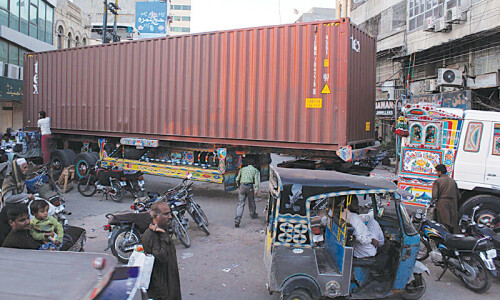
CHARSADDA: People from across Khyber Pakhunkhwa and rest of the country are thronging the Chappal Bazaar here to lay their hands on their favourite footwear – Charsadda Chappal – ahead of Eidul Fitr.
The footwear is not only famous in Pakistan but also in the Gulf States.
According to official data available with Dawn, the chappal is made at around 800 small units in Charsadda, and according to a conservative estimate, 8,000 pairs of this traditional footwear are produced daily.
According to people connected with this business, chappal-making has become an industry in Charsadda.
They said prominent artisans like Hassan Gul Ustad, Mama Ustad, Tehmash, Shehzad Mir and many others introduced a variety of new designs that are in tune with the modern demands and fashion.
Cobblers seek govt support to export the footwear
They said now traditional Charsadda Chappal was sent as gift to Gulf States, including Saudi Arabia, UAE etc.
Some seven years ago, Saudi Arabia was sent a container full of Charsadda Chappal, which was well received in the market there, but due to lack of government support this practice could not be continued, they regretted.
The traditional footwear available from Rs1,000 to Rs1,500 in these shops is sold from Rs3,000 to Rs5,000 in showrooms in other parts of the country, these people said.
The people associated with the chappal making said high value leather was used in the footwear to maintain its brightness and durability.
Though the local craftsmen have made extraordinary efforts and continued to revive the footwear industry no effort has been made at the government level to help them in flourishing this industry.
Keeping in view the skills and expertise of these cobblers, the Export Promotion Bureau had decided to establish a footwear training institute some 15 years ago, and for this purpose about 32 kanals of land had also been purchased, but the building of the institute has not yet been constructed.
However, since 2003, the EPB and Charsadda Chappal Makers Association have continued the training process in a rented house, imparting skills to thousands of youth and hundreds of women till now. Now these people are engaged in shoemaking in various factories in other cities, including Karachi and Lahore, the people associated with the business said.
According to them about 8,000 people are directly involved in shoemaking, including a significant number of women. These women while sitting in their homes engage in sole sewing and slipper making, becoming an invisible economic force to earn for their families.
These people said prices of raw material were skyrocketing. They said though most of the leather was produced in Khyber Pakhtunkhwa and Afghanistan its tanneries were in Punjab, incurring huge costs on its transportation. They said if these factories were set up in KP then not only raw material would be available cheaply and easily but thousands of people would also get employment.
These people said if the provincial government constructed footwear making units on the vacant plot of 32 kanals, then the region would become an industrial hub like Sialkot, and not only slippers but other leather products like jackets, racquets, thread and handbags would be manufactured, guaranteeing economic uplift of people.
They said there was a need to provide resources and opportunities to chappal makers to participate in exhibitions organised in the country and abroad, thus creating a new revenue-earning channel.
Published in Dawn, April 9th, 2024












































